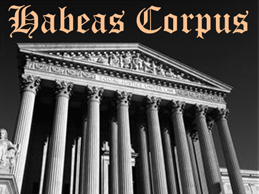Recognizing Habeas Corpus: An Attorney's Guide to Legal Civil Liberty
Recognizing Habeas Corpus: An Attorney's Guide to Legal Civil Liberty
Blog Article
The Details of Declaring a Habeas Corpus Request: An Overview for Looking For Post-Conviction Alleviation
Browsing the complexities of filing a habeas corpus request is a critical step for people looking for post-conviction relief. By discovering the intricacies of this necessary lawful device, people can discover potential opportunities for challenging sentences and ultimately strive for fair results.
Recognizing Habeas Corpus Requests
When looking for to understand habeas corpus petitions, it is critical to realize the basic legal principles underlying this effective legal treatment (Attorney). Habeas corpus, a Latin term significance "you shall have the body," is a lawsuit that allows people to look for relief from illegal detention or imprisonment. This centuries-old writ works as a safeguard versus approximate state action by offering a device for individuals to challenge the legitimacy of their confinement
The keystone of a habeas corpus petition is the assertion that the petitioner's civil liberties have been broken, causing their illegal apprehension. This can consist of claims of due procedure infractions, inadequate support of guidance, recently found proof, and even administrative mistakes. Habeas corpus petitions commonly occur in the context of criminal proceedings, where people challenge the legitimacy of their convictions or the problems of their arrest.

Grounds for Declaring
There are a number of lawful premises on which individuals may file a habeas corpus petition, each functioning as a basis for testing the lawfulness of their detention. These grounds commonly consist of constitutional violations, inadequate support of advise, recently uncovered evidence, prosecutorial misconduct, and administrative defects.
Constitutional violations develop a typical basis for filing a habeas corpus request, encompassing cases such as offenses of the right to a reasonable trial, due procedure, or defense against terrible and unusual punishment. Ineffective aid of advise cases emerge when a defendant's lawful representation during the test or allure was so lacking that it threatens confidence in the outcome. Newly found evidence, if shown to be material and likely to alter the result of the case, can likewise call for habeas alleviation. Prosecutorial transgression entails underhanded or illegal conduct by the prosecution that prejudices the offender's civil liberties. Lastly, administrative issues might arise when the court that convicted the specific did not have the authority to do so, supplying a basis for testing the detention through a habeas corpus petition.
Procedural Demands
Understanding the step-by-step needs for filing a habeas corpus request is necessary for guaranteeing that the legal process is followed precisely and properly. Failing to tire state solutions can result in the federal court dismissing the application.
In addition, there are rigorous time frame for filing a habeas corpus petition. The Antiterrorism and Effective Execution Act (AEDPA) enforces a 1 year statute of limitations, beginning with the day on which the sentence became last. Nevertheless, this due date can be based on particular exemptions based upon specific circumstances.
Furthermore, procedural needs mandate that a habeas corpus petition must include all relevant insurance claims and supporting evidence. Insufficient or not enough applications might be rejected or postponed, stressing the additional resources importance of complete prep work and adherence to procedural guidelines in seeking post-conviction relief through habeas corpus.
Testing Sentences
Just how can people successfully test convictions with the process of filing a habeas corpus petition? Testing sentences via a habeas corpus application includes providing lawful disagreements that demonstrate an infraction of civil liberties, step-by-step mistakes, or brand-new evidence that was not available during the original trial. To do well in challenging a conviction, petitioners have to show that there was an essential defect in the criminal procedures that caused a wrongful conviction or an unjust sentence. This can consist of ineffective support of advice, prosecutorial transgression, freshly discovered evidence of innocence, or offenses of the petitioner's civil liberties. Attorney.
When submitting a habeas corpus petition to test a conviction, it is crucial to adhere to strict step-by-step demands, existing compelling lawful debates supported by proof, and express just how the alleged errors affected the justness of the trial. new mexico habeas corpus attorneys. Seeking the assistance of seasoned legal professionals or organizations concentrating on post-conviction relief can greatly boost the chances of an effective outcome when testing convictions with a habeas corpus petition

Securing Fair Outcomes
To accomplish fair end results in difficult sentences through the declaring of a habeas corpus petition, people should meticulously examine the lawful basis for their insurance claims and existing engaging proof sustaining their assertions. Safeguarding reasonable outcomes in post-conviction alleviation process requires a comprehensive understanding of the lawful system, interest to detail, and strategic preparation. It is necessary to have a clear method in position, laying out the particular grounds for the application and just how today evidence straightens with legal arguments.
Furthermore, individuals looking for post-conviction relief must abide by all procedural demands and due dates to guarantee their petition is taken into consideration by the court. Failure to fulfill these demands can cause the termination of the petition without the values being assessed. Additionally, involving the services of skilled attorneys, such as attorneys concentrating on habeas corpus petitions, can dramatically improve the opportunities of protecting fair results.
Conclusion
To conclude, the details of submitting a habeas corpus petition for seeking post-conviction alleviation entail understanding the premises for filing, meeting procedural needs, challenging convictions, and safeguarding fair outcomes (massachusetts federal habeas corpus petitons). It is very important to thoroughly navigate the legal process to make certain the best chance of success in looking for relief through this opportunity. Comprehending the complexities of habeas corpus requests is necessary for individuals looking for to test their sentences and acquire justice
Report this page